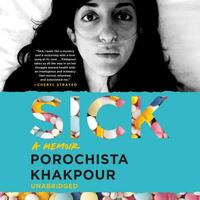Take a photo of a barcode or cover
Graphic: Drug use, Medical trauma
At the same time, Khakpour seemed to be able to give herself some grace that she was unable to give to her friends. She acknowledges that she abused and was a drug user for a long time, but friends she did drugs with were “junkies” she had no respect for. When she found out another friend was a sex worker, she looked down on her and said their relationship was never the same.
Khakpour‘s relationship to whiteness was also hard to read. Her terror in moments of heightened xenophobia and Islamophobia were gutting, but at the same time she either missed or didn’t include any moments of solidarity with POC and Muslims in her community. Instead, she gushes about a US-government funded trip to Indonesia (why was the US finding these trips? No reflection on the motives there) and makes sure to mention that she traveled to Israel for a book project (no solidarity with long-running calls for cultural boycotts?) In a taxi with a white driver, she calls her mom but tells the man, “Just so you know, it’s Farsi. I’m Iranian but not one of the bad people. Please don’t be worried by my language.” As if, were she speaking Arabic, he could have had a legitimate problem, even seeming to suggest that there are Farsi speaking women in New York he should be worried about being near, but she’s one of the good ones. Khakpour acknowledges that she sometimes passed for white, and maybe it was the toll of her incredibly long journey of illness that kept her from interrogating her perspectives on xenophobia, but these stories felt shallow and jarring compared to the depth of her discussions around her sickness.
Even in those discussions, she sometimes seemed dismissive of other chronic illnesses, particularly ableist in her writings about mental health struggles, and ready to call one alternative health program a cult while completely buying into another. I hope in the time since she wrote this, her perspectives have been widened, especially in the COVID-19 pandemic, and her politics seem to have shifted based on her social medial posts alone, so I would be very interested in a second memoir from her, and hopeful that it would contain more solidarity.
Graphic: Ableism, Addiction, Alcoholism, Chronic illness, Domestic abuse, Drug abuse, Drug use, Mental illness, Panic attacks/disorders, Racism, Sexual assault, Suicidal thoughts, Toxic relationship, Xenophobia, Islamophobia, Medical content, Grief, Medical trauma, Car accident, Gaslighting
Graphic: Addiction, Chronic illness, Drug abuse, Mental illness, Suicidal thoughts, Medical content
Moderate: Ableism, Animal cruelty, Panic attacks/disorders, Sexual assault, Toxic relationship, Car accident
Minor: Cancer, Miscarriage, Racism, Vomit, War
This book wasn't quite what I wanted it to be at the beginning. Khakpour writes more about old lovers than doctors, and hints at family trauma that's never quite unpacked. But her writing is honest and reads easily even when you can tell how hard and scary it was to write. I think some of the hype around this book has led readers to want it to be everything, to point to everything that's wrong with the medical system, especially for a WOC. It's not that, it's just one individual's story, but that story is told really well.




